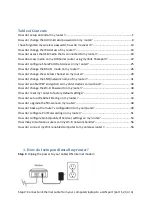
55
Chapter 5
PC and Server Configuration
This Chapter details the PC Configuration required for each PC on the local
LAN.
Overview
All Wireless Stations need to have settings which match the Wireless Access Point. These
settings depend on the mode in which the Access Point is being used.
•
If using WEP
,
WPA-PSK
,
WPA2-PSK, or WPA-PSK and WPA2-PSK, it is only
necessary to ensure that each Wireless station's settings match those of the Wireless Ac-
cess Point, as described below.
•
For WPA with radius
、
WPA2 with radius, WPA and WPA2 with radius or802.1x modes,
configuration is much more complex. The Radius Server must be configured correctly,
and setup of each Wireless station is also more complex.
•
The setting of using WPA2-PSK or WPA-PSK and WPA2-PSK is similar to the setting of
using WPA-PSK, so only describes the setting method of WPA-PSK below.
•
The setting of usingWPA2 with radius, WPA and WPA2 with radius is similar to the
setting of using WPA with radius, so only describes the setting method of WPA with ra-
dius below.
Using WEP
For each of the following items, each Wireless Station must have the same settings as the
Wireless Access Point.
Mode
On each PC, the mode must be set to
Infrastructure
.
SSID (ESSID)
This must match the value used on the Wireless Access Point.
The default value is
wireless
Note! The SSID is case sensitive.
Wireless
Security
•
Each Wireless station must be set to use WEP data encryption.
•
The Key size (64 bit, 128 bit, 152 bit) must be set to match the
Access Point.
•
The keys values on the PC must match the key values on the Access
Point.
Note
:
On some systems, the key sizes may be shown as 40bit, 104bit, and
128bit instead of 64 bit, 128 bit and 152bit. This difference arises be-
cause the key input by the user is 24 bits less than the key size used for
encryption.
5
















































